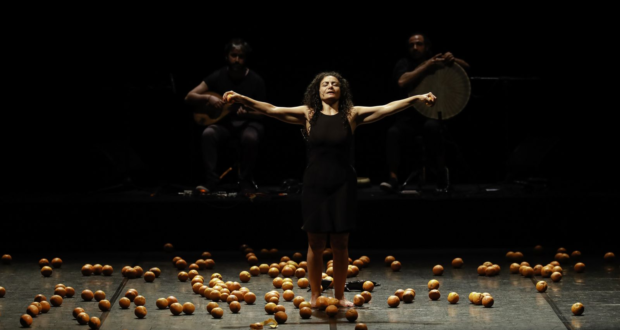Sulayman Al Bassam's I M E D E A modernises the classic Greek myth and explores the brutal choices the character makes in this complex but compelling drama.Summary
Rating
Excellent
I M E D E A is a modern retelling of a classic Greek myth. If you’re unaware of the story of Medea that won’t be an issue, as at the beginning of the performance writer and director Sulayman Al Bassam comes on to the stage to explain what the main elements of the tale are. Thus you’ll learn how Medea was married to Jason of the Argonauts fame for ten long years, how at the beginning of their relationship she’d been encouraged to murder her younger brother, and at the end – with divorce looming – she killed Jason’s new lover and her own two children.
As with most myths there are many variations on this narrative and Al Bassam has created the most modern yet, relocating Medea (Hala Omran) to the present day, where she is an educated and outspoken Arab woman with a social media following that many a famous celebrity would be envious of. She’s openly dismissive of the way society treats women, participating in interviews on television that attempt to manipulate her but which she easily deflects, which is of course what they want from her all along.
When she learns that Jason wishes to divorce her and take sole custody of her children it has a profound emotional effect on her, but we don’t really see this, as the action then leaps to twelve days later where we discover she’s been on a hunger strike during this time. For the vast majority of the production Medea remains calm despite being cruelly taunted by the unpleasant male characters she’s subjected to, and while the lack of emotion shown is a reflection of how she knows she must act in public no matter what she may really feel, it means it’s a curious performance, and one which only occasionally gives us hints of the turmoil through which we’re told her mind is going.
Al Bassam takes on nearly all of the male roles in the story, but there are also times where he breaks character and discusses what Medea means to him; how he wishes he could have played her, and the effect a cinematic portrayal had on him when younger. It’s an odd mixture, and the scenes where Al Bassam plays himself feel out of place. It’s a complex enough narrative as it is, as along with Medea’s psychological transformation there is a lot of political discourse, examinations of how refugees are treated in this world and the damaging effects of the patriarchy. I found myself feeling that his interjections interrupted the flow and took me out of the reality of the piece.
With many of the scenes there’s musical accompaniment that is often made up only of percussion as an ominous drum slowly beats throughout a scene, while knives are struck against one another. Along with recorded audio it’s used in intriguing ways and helps create an unsettling atmosphere. There are also a number of alluring songs, though the stand out number was a cover of a Velvet Underground track, and while it was beautifully performed that also took me out of the production as I wondered why it had been chosen instead of an original creation.
Despite these quandaries, this is a play that I found fascinating. Both actors create nuanced, layered and believable characters, and the themes and ideas it explores are compelling. But if anything, with her being the titular subject, I wish we’d see more of Medea’s inner life, and a little less of the characters Al Bassam portrays, and then the production might have been something I found truly enthralling.
Text & Directed by: Sulayman Al Bassam
Music by: Two, or the Dragon
Sound by: Mathilde D’Haussy
Produced by: SABAB Theatre
I M E D E A runs at Stone Nest until 1 October. Further information and bookings can be found here.
 Everything Theatre Reviews, interviews and news for theatre lovers, London and beyond
Everything Theatre Reviews, interviews and news for theatre lovers, London and beyond



